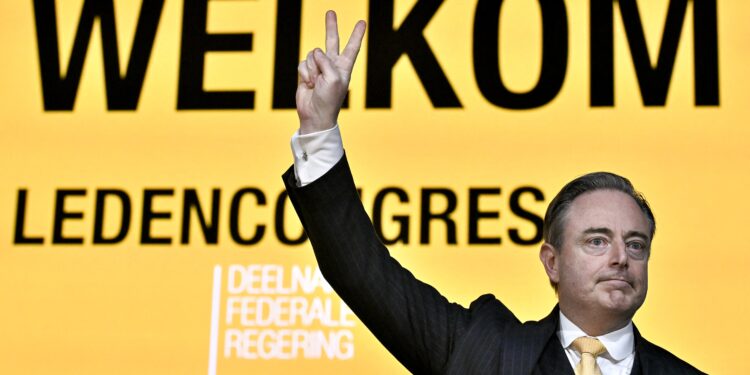Brussels – It took almost eight months but at last, also Belgium has a government. The head of the federal executive has been entrusted to Bart De Wever, leader of the Flemish conservative-nationalist Nieuw-Vlaamse Alliantie (N-VA) party, which, after last June’s elections, is the strongest of the five coalition members. The hard-won agreement between the political forces includes, among other things, a tightening on immigration and the reshaping of some of the generous national social policies.
The coalition supporting the new Belgian government will thus be composed, in addition to the right-wing nationalists of the N-VA (who in the European Parliament are part of the ECR Conservative group but are not party members), of two other Flemish parties – the Christian-Democrats of the Christen-Democratisch en Vlaams (CD&V, a member of the EPP) and the Social-Democrats of the Vooruit (part of the European Socialists) – and two Walloons, the centrists Les engagés (LE) and the liberal-conservatives of Mouvement réformateur (MR), both affiliated with Renew. The parliamentary majority holds 81 seats out of 150 in the House of Representatives, the lower chamber of Belgium’s bicameral legislature.
This five-party alliance has been dubbed “Arizona” due to the colors of its members resemble those of the flag of the US state with the same name. However, the ability to find a compromise position on the most contentious issues has to be seen, and, according to many observers, the difficulties encountered by negotiators in the talks are not a good sign.
The talks to form the government began after the June 9 elections, when voters chose their representatives in the federal and European parliaments. The polls had confirmed a slide to the right in the assembly, with a noteworthy advance of the N-VA (first party with 16.7 percent) and the historic win by the Flemish secessionists of the Vlaams Belang (VB), which came second with 13.8 percent.
Therefore, King Philippe mandated the 54-year-old De Wever – who in the past called for the “evaporation” of Belgium – to form an executive. However, it took 234 days before seeing a successful outcome. Not that such a long gestation is new in Belgium: after the 2019 elections, it took 493, while the record was in 2010, with 541 days of impasse.
The appointment of De Wever as prime minister took place this morning (Feb. 3) by the hand of the monarch after finally reaching an agreement on Friday evening (Jan. 31). Negotiators remained at the negotiating table throughout the night — until Saturday morning — to refine the program.
And now to work!
And now, back to work!
And now get to work! pic.twitter.com/qtKCXucSeG
– Bart De Wever (@Bart_DeWever) February 3, 2025
In addition to the prime minister, who picks up the baton from the Flemish liberal Alexander De Croo, the N-VA takes home three ministries (Finance, Defense and Migration); four others got the MR (including the portfolios of Economy and Interior), while Vooruit, CD&V, and LE each have two ministers.
Each political force has claimed its successes in negotiating and shaping the government agenda, which, on paper, provides several key points. It ranges from reducing taxes on labor to maintaining the indexing of wages and pensions to inflation (albeit with some adjustments to the current system, such as cutting unemployment benefits for the under-55s) from investment in renewables (which will be accompanied by higher taxation of fossil fuels) to upgrading rail lines.
And then from the abolition of the Senate and a stop to state funding to parties to a new focus on public health care, from the introduction of a “solidarity contribution” aimed at the better-off sections of the population (a 10 percent tax on capital gains from the sale of shares) and an increase in taxes on banks to a clampdown on illegal immigration and border controls, coupled with an accelerated procedure for repatriations and a crackdown on family reunifications.
Moreover, the tightening of migration policies – as well as the increased investment in the defense sector, another item on the new government’s agenda – follows a trend that involves the entire continent at this political stage, characterized by a marked shift to the right not only in the European Parliament but also by community executive.
It also reflects the stance of the chancelleries represented at the Council: Belgium now joins a growing front of Member States led by conservative executives, soon to be joined by Germany (where the leader of the CDU and likely next chancellor Friedrich Merz is flirting with the far-right wing of the AfD) and Austria (in Vienna the post-Nazi right wing of the FPÖ is likely to lead the government for the first time since World War II).
English version by the Translation Service of Withub





![[foto: European Council]](https://www.eunews.it/wp-content/uploads/2025/02/ue-georgia-120x86.png)
